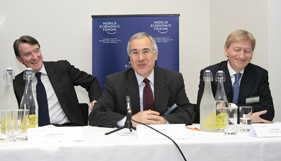TASK FORCE PRESENTS PLAN FOR PRIVATE SECTOR “CLEAN REVOLUTION” TO COMPLEMENT UN CLIMATE NEGOTIATIONS
Sunday, 29 Sep, 2009
0

World Economic Forum’s Low-Carbon Prosperity Task Force provides leaders at UN climate talks with plan to accelerate private sector investment and innovation to build a clean, green economy
Key areas identified for action in next 5-10 years are increased energy efficiency, technological development, investment in low-carbon infrastructure, and halting deforestation
A World Economic Forum task force has presented world leaders with concrete proposals to accelerate private sector investment and innovation in the fight against climate change. Eighty business leaders and over 40 environmental and scientific experts from around the world outlined a plan for stimulating a “clean revolution” in the private sector within the next few years even as governments continue negotiations on a climate policy framework in the United Nations.
The Forum’s Low-Carbon Prosperity Task Force presented its proposals to Gordon Brown, Prime Minister of the United Kingdom, in New York, where the UN General Assembly is conducting a climate change summit. "This report shows that there is a strong business lobby for an ambitious climate change agreement at Copenhagen. I welcome the role of this authoritative task force in showing the benefits of such an agreement for low-carbon growth and job creation. I hope other world business leaders will join this initiative," said Brown.
Richard Samans, Managing Director of the World Economic Forum, said: “The world needs a two-track approach to climate change that includes not only a top-down set of national commitments, which is what governments will try to negotiate in Copenhagen, but also a more direct, bottom-up strategy to speed green innovation, investment and the application of best available technology in the private sector.”
Sam DiPiazza, former global CEO of PricewaterhouseCoopers International and Chair of the World Business Council for Sustainable Development said: "Building a global, low carbon economy will require the rapid mobilisation of substantial public and private funds. This report sets out specific and practical proposals. It’s a call for action on a global deal at Copenhagen, and a clear commitment from business leaders to work with governments and policy makers to accelerate the transition to a low carbon economy."
Finance: Developing country demands for large-scale financial and technological assistance from developed countries has emerged as one of the major sticking points in the UN negotiations. The Task Force breaks new ground by proposing regional, public-private, low-carbon energy investment funds around the world. Run by the private sector, these funds would be capable of leveraging increases in foreign aid many times over with equity and debt investment from private investors.
These public-private funds could mobilize an estimated US$ 50-75 billion every three years in each region of the world. This financing structure would be capable of generating over US$ 1 trillion in investment in developing countries over the next 15 years. This is far beyond what is likely to be generated by increased foreign aid alone.
Accounting: The report proposes the creation of a new, uniform accounting standard to permit apples-to-apples comparisons of carbon-related risks and opportunities.
Consumers: To help consumers make more informed choices, the report proposes the creation of a global standard for the labelling of carbon footprints on consumer products.
Energy Efficiency: The report suggests that an official platform be created for companies around the world in the same industry to work together on sharing and spreading technology. Firms and governments would also look to develop minimum global standards for certain energy-intensive industrial products.
Technological Development: To speed the development of promising new technologies and make efficient use of public and private R&D expenditures, the Task Force proposes the creation of public-private consortia:
A public-private initiative to create an international portfolio of 10 large-scale integrated smart grid demonstration projects across different major cities and regulatory regimes.
A public-private initiative to create an international portfolio of up to 25 carbon capture and/or sequestration (CCS) demonstration projects between 2013 and 2025.
A network of regional energy research and innovation centres modelled on the Consultative Group on International Agricultural Research (CGIAR).
The Task Force argues that adding a practical agenda of public-private cooperation to the international community’s current climate change strategy would be in the political interest of all governments. Scientists have warned that the world must act very soon if it is to succeed in stabilizing greenhouse emissions by mid-century at safe levels. By taking these steps to spur earlier and more widespread action within the private sector, governments could not only ensure faster achievement of the targets they set in the UN negotiations, but also maintain momentum in the fight against climate change if it turns out that they need more time than anticipated to conclude these talks or implement effective national limits on emissions.
Other proposals of the Task Force include:
- Remove energy subsidies
- Reforestation
- Support development of efficient, interlinked carbon markets.
- Develop innovative public-private financing mechanisms for climate-change adaptation
Valere Tjolle
This month’s big opportunity to ride the downturn: www.travelmole.com/stories/1138679.php
Valere
Have your say Cancel reply
Most Read
TRAINING & COMPETITION
 United Kingdom
United Kingdom United States
United States Asia Pacific
Asia Pacific












































BA suspending all Heathrow to Abu Dhabi flights
Turkish Airlines flight in emergency landing after pilot dies
Unexpected wave rocks cruise ship
Woman dies after going overboard in English Channel
Foreign Office issues travel advisory for winter sun destinations